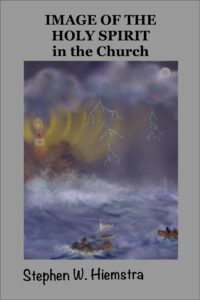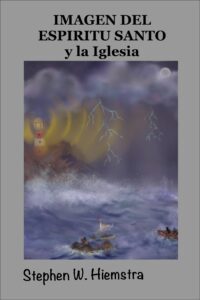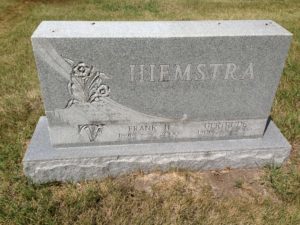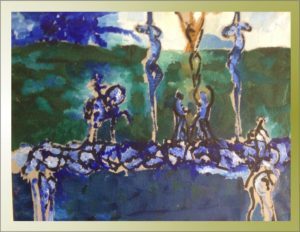Stephen W. Hiemstra's Blog, page 16
April 20, 2025
Mark 16: Easter
 “And he said to them, Do not be alarmed. You seek Jesus of Nazareth, who was crucified.
“And he said to them, Do not be alarmed. You seek Jesus of Nazareth, who was crucified.
He has risen; he is not here. See the place where they laid him” (Mark 16:6 ESV).
By Stephen W. Hiemstra
One of the most vivid memories I have as a young person was the experience of an Easter sunrise. Easter is mysterious, earth-shattering news. How could I sleep through it?
Funeral
At my grandfather’s funeral, I was given a head of wheat which hangs now in my kitchen. The wheat reminds me of Jesus’ saying: “Truly, truly, I say to you, unless a grain of wheat falls into the earth and dies, it remains alone; but if it dies, it bears much fruit” (John 12:24 ESV).
Resurrection Reminders
The mystery of resurrection is everywhere in nature. Sunrise is the resurrection of the day. Springtime is the resurrection of the seasons. The metamorphosis from caterpillar to cocoon to adult butterfly is a beautiful, dramatic resurrection. The Apostle Paul writes: “all of creation groans in anticipation of our redemption” (Romans 8:19-23).
Messianic Prophecies
Prophesies of Jesus’ resurrection start early in scripture. Systematic theologians see salvation history as creation, fall, and redemption. Because sin is the cause of death, eternal life requires forgiveness of sin which is brought about in Christ’s resurrection. This transition is prophesied in Genesis: “I will put enmity between you and the woman, and between your offspring and her offspring; he shall bruise your head, and you shall bruise his heel” (Gen 3:15 ESV).
Other theologians see resurrection arising out of righteous suffering. The prophet Job writes not only of Christ, but his own resurrection: “For I know that my Redeemer lives, and at the last he will stand upon the earth. And after my skin has been thus destroyed, yet in my flesh I shall see God, whom I shall see for myself, and my eyes shall behold, and not another” (Job 19:25-27 ESV). At the birth of the church on Pentecost (Acts 2:27), the Apostle Peter sees resurrection prophesied by King David: “For you will not abandon my soul to Sheol, or let your holy one see corruption” (Psalm 16:10).
When asked to produce a sign Jesus himself spoke of the sign of Jonah (Luke 11:29-32). In the belly of the whale Jonah prayed: “I called out to the LORD, out of my distress, and he answered me; out of the belly of Sheol I cried, and you heard my voice” (Jonah 2:2 ESV). And the whale spit him out on dry land, another resurrection story.
Old Testament Resurrections Accounts
Resurrection did not start with Jesus. Some see the story of the binding of Isaac as a resurrection account and a prophecy of the cross (Genesis 22:1-18). The prophet Elisha raises the Shunammite’s son from the dead (2 Kings 4:32-37). In the valley of bones, Ezekiel prophesied about resurrection of the Nation of Israel (Ezekiel 37:3-6). The exodus of the nation of Israel from Egypt and the return of the exiles from Babylon are both resurrection accounts where a dead nation rises to new life.
New Testament Resurrection Accounts
In the gospels, Jesus himself performed several resurrections. He raised Jairus’s daughter from the dead (Mark 5:22-43). He raised the widow’s son (Luke 7:12-17). Most remarkably, after lying four days in the tomb he raised Lazarus from death (John 11:1-45). Like other resurrections, Jesus’ healings and exorcisms brought hope where there was none.
Some scholars believe that John Mark’s gospel recorded Apostle Peter’s testimony while he was in Rome during AD 41-54. Mark later traveled with Paul. Mark’s role was to teach about the life of Jesus. Later, Luke may have assumed this role in Paul’s missionary team.
Mark’s Unusual Ending
Interestingly, Mark did no see the gospel ending with Jesus. Neither did Luke whose gospel was followed by the Book of Acts. Mark’s gospel starts with: “The beginning of the gospel of Jesus Christ, the Son of God” (Mark 1:1 ESV). Scholars believe that Mark’s gospel ends with the woman going out from the tomb to relay the angel’s message: “But go, tell his disciples and Peter that he is going before you to Galilee” (Mark 16:7 ESV). Likewise, our part in salvation history is to pass on the story. As the hymnist Katherine Hankey (1834-1911) writes: “I love to tell the story, of unseen things above, of Jesus and his glory, of Jesus and his love…” [2]
Christian Hope
Christian hope starts with the resurrection: we know that death is not the end of life’s story. And because we know the rest of the story, we can invest in life and live each day with boldness and joy
Footnotes
Did Abraham believe God would raise Isaac from the dead? Why did the angel have to tell Abraham twice?
[2] www.hymnsite.com/lyrics/umh156.sht
Mark 16: Easter
Also see:
The Face of God in the Parables
The Who Question
Preface to a Life in Tension
Other ways to engage online:
Author site: http://www.StephenWHiemstra.net
Publisher site: http://www.T2Pneuma.com
Newsletter at: https://bit.ly/East25 , Signup
The post Mark 16: Easter appeared first on T2Pneuma.net.
Evangelistic Prayer

By Stephen W. Hiemstra
Beloved Lord Jesus,
All praise and honor, power and dominion, truth and justice are yours because you teach us the errors of our ways and draw us closer to you in spite of vast differences in time, space, and moral distance.
Forgive us for being slow learners that do not understand or want to understand you will for our lives.
Thank you for the ministry of devout pastors, the inspiration of reasoned prophets, and the arguments of learned evangelists that draw us to you and build up your church.
In the power your Holy Spirit, open our hearts, illumine our thoughts, and strengthen our hands in your service.
In the name of the Father, the Son, and the Holy Spirit, Amen.
Evangelistic Prayer
Also see:
The Face of God in the Parables
The Who Question
Preface to a Life in Tension
Other ways to engage online:
Author site: http://www.StephenWHiemstra.net
Publisher site: http://www.T2Pneuma.com
Newsletter at: https://bit.ly/East25 , Signup
The post Evangelistic Prayer appeared first on T2Pneuma.net.
Oración Evangelística

Por Stephen W. Hiemstra
Amado Señor Jesús,
Toda la alabanza y el honor, el poder y el dominio, la verdad y la justicia son tuyos porque nos enseñas los errores de nuestros caminos y nos acercas a ti a pesar de las enormes diferencias de tiempo, espacio y distancia moral.
Perdona nos para ser aprendidos despacioso que no entienden o quieren a intentar tu voluntad para nuestras vidas.
Gracias por el ministerio de pastores devotos, la inspiración de profetas razonados y los argumentos de evangelistas eruditos que nos atraen hacia ti y edifican tu iglesia.
En el poder de tu Espíritu Santo, abre nuestros corazones, ilumina nuestros pensamientos y fortalece nuestras manos en tu servicio.
En el nombre del Padre, del Hijo y del Espíritu Santo, Amén.
Oración Evangelística
Vea También:
Una Guía Cristiana a la Espiritualidad
Vida en Tensión
Otras Formas de Interactuar en Línea:
Sitio Web del Autor: http://www.StephenWHiemstra.net
Sitio Web del Editor: http://www.T2Pneuma.com
Boletín Informativo en: https://bit.ly/East25 , Signup
The post Oración Evangelística appeared first on T2Pneuma.net.
April 19, 2025
Mark 15: Holy Saturday
 “And Joseph bought a linen shroud, and taking him down, wrapped him in the linen shroud
and laid him in a tomb that had been cut out of the rock.
“And Joseph bought a linen shroud, and taking him down, wrapped him in the linen shroud
and laid him in a tomb that had been cut out of the rock.
And he rolled a stone against the entrance of the tomb.” (Mark 15:46 ESV)
By Stephen W. Hiemstra
Jesus is buried on the Day of Preparation which ends at sundown when the Jewish Sabbath begins. This detail in Mark’s Gospel is important because burial was forbidden on the Sabbath and executed criminals could not hang overnight (Deut 21:23). The Gospels mention nothing taking place on the Sabbath while Jesus lay in the tomb and the narrative resumes on the following day. In other words, Jesus rested in the tomb over the Sabbath. Holy Saturday was a day of mourning and grief.
A Grieving HolidayGrief is more than crying. In Jesus’ Beatitudes, Matthew records: “Honored are those who mourn, for they shall be comforted.” (Matt 5:4) Luke records: “Honored are you who weep now, for you shall laugh.” (Luke 6:21) Both accounts of this Beatitude are written in the form of a lament which has two parts. In the first part, one empties the heart of all grief and pain and anxiety in prayer to God; in the second part, having been emptied the heart turns to God in praise. In the lament, when we grieve, we make room in our hearts for God.
The Theology of LamentThe most famous lament in the Bible is cited by the Gospel of Mark as Jesus’ last words: “My god, my god, why have you forsaken me?” (Mark 15:34) These words come from Psalm 22 verse one which turns to God in verse 19: “But You, O LORD, be not far off; O You my help, hasten to my assistance.” At a time when much of scripture was memorized, rabbis would cite the first part of a passage knowing that the audience would fill in the missing part. Knowing this tradition, Jesus could cite the first verse in Psalm 22 knowing that people hearing him would know the Psalm and how it ended.
Jesus gave us a template for dealing with grief the night before during his prayer in Gethsemane. Mark records that Jesus’ prayed three times: “Abba! Father! All things are possible for You; remove this cup from Me; yet not what I will, but what You will.” (Mark 14:36). Jesus is aware that he stands before the cross and does not want to die; still, he yields to God’s will. Each time we face pain and grief we are faced with a decision: do we turn to God or do we turn into our grief? Our identity is crafted from a lifetime of such decisions.
Joseph of ArimatheaThe story of Joseph of Arimathea is instructive. Mark records: “Joseph of Arimathea, a respected member of the council, who was also himself looking for the kingdom of God, took courage and went to Pilate and asked for the body of Jesus.” (Mark 15:43) Asking for the body of a man just crucified for sedition took guts. Yet, with no expectation of resurrection, on a day when Jesus’ inner circle was in hiding and in fear, Joseph “took courage” and asked Pilate for the body of Jesus. Then, he buried him in his own grave [4].
Holy Saturday Reveals our TheologyHoly Saturday is a time to reflect on Christ’s crucifixion. Are we among those happy to see Jesus in the tomb or are we looking forward to the kingdom of God like Joseph of Arimathea? This Gethsemane moment is one of many in this life. The answer to the implied question—Do we turn to God in our pain or sulk?—ultimately defines who we are because life includes many such Gethsemane moments and we have a special relationship with pain.
FootnotesBurial is work, hence forbidden on the Sabbath (e.g. Deut 5:12-15).
Also: Matthew 27:46. The direct citation of an Aramaic expression—“Eli, eli, lama sabachthani?” in both the Mark and Matthew accounts makes it more likely that these are the actual words of Jesus. This is because the most important expressions in the Bible are cited directly rather than translated or, in this case, the actual words are both cited and translated.
Jesus does exactly that in Matthew 21:16 citing Psalm 8:2.
[4] What a picture of substitutionary atonement—Jesus was buried in my grave so that I do not have to be.
Mark 15: Holy SaturdayAlso see:A Roadmap of Simple FaithChristian Spirituality Looking Back A Place for Authoritative PrayerOther ways to engage online:Author site: http://www.StephenWHiemstra.net, Publisher site: http://www.T2Pneuma.com. Newsletter at: https://bit.ly/East25 , SignupThe post Mark 15: Holy Saturday appeared first on T2Pneuma.net.
April 18, 2025
Mark 15: Good Friday

“And when the centurion, who stood facing him, saw that in this way he breathed his last, he said,
Truly this man was the Son of God!” (Mark 15:39 ESV)
By Stephen W. Hiemstra
Second Trial
Pontius Pilate gets right to the point: “Are you the King of the Jews?” Jesus answers with two words–σὺ λέγεις—which means: you say (Mark 15:2). The chief priests accuse him of many things. Pilate asks Jesus a second question: “Have you no answer to make?” (Mark 15:4) Jesus does not respond (Isaiah 53:7). Pilate is amazed.
First Trial
The night before, the high priest asked Jesus if he is the Messiah (Christ). Jesus responded using the words God from Exodus 3:14 saying: “I am”. Then, in case anyone misunderstood him, he paraphrased the messianic prophecy in Daniel 7:13: “you will see the Son of Man seated at the right hand of Power, and coming with the clouds of heaven” (Mark 14:62 ESV). The high priest accordingly accused Jesus of blasphemy which is punishable by stoning under Jewish law (Leviticus 24:16). But since Rome reserved the right to decide all cases of capital punishment, the chief priests accused Jesus of the political crime of sedition—treason against Rome. This is why Pilate asked Jesus: “Are you the King of the Jews?” (Mark 15:2)
What Kind of Messiah?
Realizing that Jesus is innocent of the charge of sedition, like a good politician Pilate begins working the crowd. In offering to release a prisoner named Barabbas, who was guilty of both sedition and murder (Mark 15:7), Pilate is effectively asking the crowd what kind of Messiah they prefer. The crowd asked for Barabbas who was known to be a Jewish nationalist—in other words, the crowd prefers a kingly Messiah.
Messiah means anointed one in Hebrew which translates as Christ in Greek. Three types of roles are anointed: prophets, priests, and kings. In his earthly ministry, Jesus embodied the first two roles (prophet and priest), but the crowd wanted a king—someone to drive the Romans out—as we saw earlier in Mark 11:10.
So Pilate gave them what they wanted (Romans 1:24-25), washed his hands of the decision, and sent Jesus to the cross.
Mark 15: Good Friday
Also see:
The Face of God in the Parables
The Who Question
Preface to a Life in Tension
Other ways to engage online:
Author site: http://www.StephenWHiemstra.net
Publisher site: http://www.T2Pneuma.com
Newsletter at: https://bit.ly/East25 , Signup
The post Mark 15: Good Friday appeared first on T2Pneuma.net.
The Church in Paul’s Evangelism

“Having been forbidden by the Holy Spirit
to speak the word in Asia. …
And a vision appeared to Paul in the night:
a man of Macedonia was standing there,
urging him and saying, come over to Macedonia
and help us.” (Acts 16:6-9)
By Stephen W. Hiemstra
The manifestation of the Holy Spirit in the Apostle Paul’s writing is most obvious in his calling as an evangelist to the gentiles (Rom 11:13). Yet, more than any other author in the New Testament Paul worked to embody the Holy Spirit to establish churches, mentor its leaders, and explain the Gospel in deeply theological terms. In his evangelism and leadership, Paul exhibits the heart of pastor, lives out holy and inclusive leadership, and remains sensitive to the nudges of the Holy Spirit.
Set Apart for Leadership
More than any others, Paul mentored church leaders. Listen to Paul’s words to Timothy concerning his call to leadership in the church:
“Now in a great house there are not only vessels of gold and silver but also of wood and clay, some for honorable use, some for dishonorable. Therefore, if anyone cleanses himself from what is dishonorable, he will be a vessel for honorable use, set apart as holy, useful to the master of the house, ready for every good work. So flee youthful passions and pursue righteousness, faith, love, and peace, along with those who call on the Lord from a pure heart.” (2 Tim 2:20-22)
Here Paul compares the church to a “great house” presumably of someone wealthy enough to have “vessels of gold and silver.” A leader is someone “set apart as holy” and “ready for every good work” who flees “youthful passions” and pursues “righteousness, faith, love, and peace” having a “pure heart.”
Clearly, Paul’s sees a Christian leader in the church as someone created in the image of God himself and willing to live into that image. Much like in Paul’s discussion of the fruits of the spirit— “love, joy, peace, patience, kindness, goodness, faithfulness, gentleness, self-control” (Gal 5:22-23), we hear an echo of God’s own attributes revealed to Moses on Mount Sinai: “The LORD, the LORD, a God merciful and gracious, slow to anger, and abounding in steadfast love and faithfulness.” (Exod 34:6) Exhibiting these attributes, we see Paul’s image for the church reflected in a holy heart:
“Or do you not know that your body is a temple of the Holy Spirit within you, whom you have from God? You are not your own, for you were bought with a price. So glorify God in your body.” (1 Cor 6:19-20)
Paul envisions the church as an outward manifestation of an inward reality.
Church as an Agency of the Holy Spirit
The agency of the Holy Spirit in founding and sustaining the church is highlighted in the Apostle Paul’s term for the church. (Thompson 2014, 25) He refers to the church as the “called out ones of God” in Greek. (e.g. 1 Cor 1:2) When those called by God get together, that is the church. The church is not a building or club; it is composed only of those called out by God himself. Because only God truly knows who he has called, the Westminster Confession of faith disguises the visible church we see from the invisible church seen only by God. (PCUSA 1999, 6.140) Jesus himself makes this distinction in his parable of the wheat and the tares. (Matt 13:24–30)
The authority of the church and of the Bible rests on the agency of the Holy Spirit. This authority is often physically manifested in the laying on of hands in coming to faith (e.g. Acts 8:17), during ordination (e.g. Num 27:18; 1 Tim 5:22), and in healing (e.g. Luke 4:40) echoing the practice of the patriarchs in passing on the righteous lineage of God. Other-times, the Holy Spirit acts independently of the church through visions and through the reading of scripture to bring oftentimes surprising people to faith.
Inclusive Leadership
Paul’s commitment to theological discourse is especially obvious in his promotion of inclusive leadership. Consider Paul’s sermon on Mars Hill: “The times of ignorance God overlooked, but now he commands all people (ἀνθρώποις) everywhere to repent.” (Acts 17:30) Moments after saying that “all people everywhere” must repent to an audience of Greek philosophers in their most sacred and scholarly location, Paul is seen evangelizing a woman: “But some men joined him and believed, among whom also were Dionysius the Areopagite and a woman named Damaris and others with them.” (Acts 17:34) So, while anthropois (ἀνθρώποις) is gender ambiguous (plural male included women in common use) in this context, Paul’s actions suggests that his intent is inclusive. Hence, the translation reads people, not men.
If Paul were a typical misogynist, he would not speak to any women about the Gospel. Yet, Paul’s strongest support came from the church that he established in the city of Phillipi, where Roman soldiers went to retire. Listen to how this church came into being:
“And on the Sabbath day we went outside the gate to the riverside, where we supposed there was a place of prayer, and we sat down and spoke to the women who had come together. One who heard us was a woman named Lydia, from the city of Thyatira, a seller of purple goods, who was a worshiper of God. The Lord opened her heart to pay attention to what was said by Paul.” (Acts 16:13-14)
Paul lived out his statement of “all people everywhere,” which is why he evangelized women and was able to write: “There is neither Jew nor Greek, there is neither slave nor free, there is no male and female, for you are all one in Christ Jesus.” (Gal 3:28) Who else could persuasively argue with a slaveholder that his runaway slave should be considered a brother in Christ? (Phlm 1:16)
Paul’s commitment to theological discourse is usually touted in his letter to the church at Rome, where he employs a highly philosophical, nurture-nature argument to advance the Gospel. Yet, the depth of Paul’s commitment to inclusive leadership in mentoring a young Timothy, forgiving Onesimus, and evangelizing women like Lydia demonstrates more clearly that Paul took his theology to heart, a spirituality of lived theology. One has to wonder whether Paul’s inclusive leadership theology, far from being incidental, revealed a key strategy in his evangelism founded on Joel’s Prophecy (Joel 2:28-29).
The Church in Paul’s Evangelism
Also see:
The Face of God in the Parables
The Who Question
Preface to a Life in Tension
Other ways to engage online:
Author site: http://www.StephenWHiemstra.net
Publisher site: http://www.T2Pneuma.com
Newsletter at: https://bit.ly/East25 , Signup
The post The Church in Paul’s Evangelism appeared first on T2Pneuma.net.
La Iglesia en los Escritos de Pablo

¨Habiendo sido impedidos por el Espíritu Santo
de hablar la palabra en Asia (provincia occidental de Asia Menor)…
Por la noche se le mostró a Pablo una visión:
un hombre de Macedonia estaba de pie,
suplicándole: Pasa a Macedonia y ayúdanos.”
(Hechos 16:6-9)
Por Stephen W. Hiemstra
La manifestación del Espíritu Santo en los escritos del apóstol Pablo es más obvia en su llamado como evangelista de los gentiles (Rom 11:13). Sin embargo, más que cualquier otro autor del Nuevo Testamento, Pablo trabajó para encarnar el Espíritu Santo para establecer iglesias, orientar a sus líderes y explicar el Evangelio en términos profundamente teológicos. En su evangelización y liderazgo, Pablo exhibe el corazón de un pastor, viviendo un liderazgo santo e inclusivo, pero permaneciendo sensible a los impulsos del Espíritu Santo.
Apartados para el Liderazgo
Más que otros autores del Nuevo Testamento, Pablo fue mentor de líderes de las iglesias. Escuche las palabras de Pablo a Timoteo respecto a su llamado al liderazgo en la iglesia:
¨Ahora bien, en una casa grande no solamente hay vasos de oro y de plata, sino también de madera y de barro, y unos para honra y otros para deshonra. Por tanto, si alguien se limpia de estas cosas, será un vaso para honra, santificado, útil para el Señor, preparado para toda buena obra. Huye, pues, de las pasiones juveniles y sigue (busca) la justicia, la fe, el amor y la paz, con los que invocan al Señor con un corazón puro.¨ (2 Tim. 2:20-22)
Aquí Pablo compara la iglesia con ¨una gran casa”, presumiblemente de alguien lo suficientemente rico como para tener “vasos de oro y plata.” Un líder es alguien ¨se limpia de estas cosas¨ y ¨preparado para toda buena obra¨ quien ¨huye, pues, de las pasiones juveniles¨ y ¨sigue (busca) la justicia, la fe, el amor y la paz¨ ¨invocan al Señor con un corazón puro.¨ Aquí vemos tanto un llamado a la santidad como a la piedad (Bridges 1996, 7).
Claramente, Pablo ve al líder cristiano en la iglesia como alguien creado a la imagen de Dios mismo y dispuesto a vivir a esa imagen. Al igual que en la discusión de Pablo sobre los frutos del espíritu—“amor, gozo, paz, paciencia, benignidad, bondad, fidelidad, mansedumbre, dominio propio” (Gal 5:22-23), escuchamos un eco de los propios atributos de Dios revelados a Moisés en el Monte Sinaí: “el SEÑOR, el SEÑOR, Dios compasivo y clemente, lento para la ira y abundante en misericordia y verdad (fidelidad).¨ (Exod 34:6) Exhibiendo estos atributos, vemos la imagen de Pablo para la iglesia reflejada en un corazón santo:
¨¿O no saben que su cuerpo es templo del Espíritu Santo que está en ustedes, el cual tienen de Dios, y que ustedes no se pertenecen a sí mismos? Porque han sido comprados por un precio. Por tanto, glorifiquen a Dios en su cuerpo y en su espíritu, los cuales son de Dios.¨ (1 Cor 6:19-20)
Pablo imagina la iglesia como una manifestación externa de una realidad interna. Los querubines custodian el templo de Dios, lo cual Niehaus (2014, 122-123) cita como evidencia de que los creyentes —como templos del Espíritu Santo— también están protegidos por ángeles guardianes.
La Iglesia como una Agente del Espíritu Santo
La acción del Espíritu Santo en la fundación y sostenimiento de la iglesia se destaca en el término que el apóstol Pablo utiliza para la iglesia (Thompson 2014, 25). Se refiere a la iglesia como los “llamados de Dios” en griego (e.g. 1 Cor 1:2). Cuando los llamados por Dios se reúnen, esa es la iglesia. La Iglesia no es un edificio ni un club; está compuesta únicamente por aquellos llamados por Dios mismo. Porque sólo Dios sabe verdaderamente a quién ha llamado, la Confesión de fe de Westminster diferencia la iglesia visible que vemos de la iglesia invisible que sólo ve Dios (PCUSA 1999, 6.140). Jesús mismo hace esta distinción en su parábola del trigo y la cizaña (Mateo 13,24-30).
La autoridad de la iglesia y de la biblia reposan en la agencia del Espíritu Santo. Esta autoridad se manifestó fisicamente en la restando de los manos en llegando a fe (por ejemplo Hechos 8:17), en sanación (por ejemplo Lucas 4:40), y durante ordenación (por ejemplo Num 27:18; 1 Tim 5:22), lo cual hace eco de la práctica de los patriarcas de transmitir el linaje justo de Dios. A menudo, el Espíritu Santo actúa independientemente de la iglesia a través de visiones y de la lectura de las Escrituras para llevar a personas sorprendentes a la fe, como el apóstol Pablo.
Liderazgo Inclusivo
El compromiso de Pablo con el discurso teológico es especialmente obvio en su promoción del liderazgo inclusivo.
Considere el sermón de Pablo en el Areópago: ¨Por tanto, habiendo pasado por alto los tiempos de ignorancia, Dios declara ahora a todos los hombres (anthropois), en todas partes, que se arrepientan.¨ (Hechos 17:30) Momentos después de decir que “todas las personas en todas partes” deben arrepentirse ante una audiencia de filósofos griegos en su lugar más sagrado y erudito, se ve a Pablo evangelizando a una mujer: ¨Pero algunos se unieron a él y creyeron, entre los cuales estaban Dionisio el Areopagita, una mujer llamada Dámaris y otros con ellos.¨ (Hechos 17:34) Así, aunque anthropois es ambiguo en cuanto al género (el plural masculino incluye a las mujeres en el uso común) en este contexto, las acciones de Paul sugieren que su intención es inclusiva. Por lo tanto, la traducción al español dice todas las personas, no todos los hombres.
Si Pablo fuera un misógino típico, no hablaría con ninguna mujer sobre el Evangelio.
Sin embargo, el apoyo más fuerte de Pablo provino de la iglesia que él estableció en la ciudad de Filipos, donde los soldados romanos fueron a se jubilar. Escuche cómo surgió esta iglesia:
¨El día de reposo salimos fuera de la puerta (de la ciudad), a la orilla de un río, donde pensábamos que habría un lugar de oración. Nos sentamos y comenzamos a hablar a las mujeres que se habían reunido. Y estaba escuchando cierta mujer llamada Lidia, de la ciudad de Tiatira, vendedora de telas de púrpura, que adoraba a Dios; y el Señor abrió su corazón para que recibiera lo que Pablo decía.¨ (Hechos 16:13-14)
Pablo vivió su declaración de “todas las personas en todas partes”, por eso evangelizó a las mujeres y pudo escribir: ¨No hay Judío ni Griego; no hay esclavo ni libre; no hay hombre ni mujer, porque todos son uno en Cristo Jesús.¨ (Gal 3:28) ¿Quién más podría argumentar persuasivamente con un dueño de esclavos que su esclavo fugitivo debería ser considerado un hermano en Cristo? (Fil. 1:16)
El compromiso de Pablo con el discurso teológico suele destacarse en su carta a la iglesia en Roma, donde emplea un argumento altamente filosófico de crianza-naturaleza para promover el Evangelio. Sin embargo, la profundidad del compromiso de Pablo con el liderazgo inclusivo al ser mentor de un joven Timoteo, perdonar a Onésimo y evangelizar a mujeres como Lidia demuestra más claramente que Pablo tomó su teología en serio, una espiritualidad de teología vivida (Chan 1998,16). Cabe preguntarse si la teología del liderazgo inclusivo de Pablo, lejos de ser incidental, reveló una estrategia clave en su evangelización fundada en la profecía de Joel (2:28-29).
La Iglesia en los Escritos de Pablo
Vea También:
Una Guía Cristiana a la Espiritualidad
Vida en Tensión
Otras Formas de Interactuar en Línea:
Sitio Web del Autor: http://www.StephenWHiemstra.net
Sitio Web del Editor: http://www.T2Pneuma.com
Boletín Informativo en: https://bit.ly/East25 , Signup
The post La Iglesia en los Escritos de Pablo appeared first on T2Pneuma.net.
April 17, 2025
Mark 14: Maundy Thursday
 Foot washing
Foot washing“Three times a year all your males shall appear before the LORD your God at the place that he will choose: at the Feast of Unleavened Bread (הַמַּצּ֛וֹת), at the Feast of Weeks (הַשָּׁבֻע֖וֹת), and at the Feast of Booths (הַסֻּכּ֑וֹת; Deuteronomy 16:16 ESV).
By Stephen W. Hiemstra
Holy Week as we know it is often celebrated at the same time as the Jewish Feast of Unleavened Bread (Festival of Matzos) often called Passover. Dates differ because of differences in the calendar rules. In Jesus’ time, Passover was one of three festivals that required the faithful to travel to Jerusalem. The other festival familiar to Christians is the Feast of Weeks commonly known as Pentecost. The Feast of Booths is a harvest festival in the fall.
Passover Backstory
Passover commemorates the release of the Jewish people from slavery in Egypt. God instructed Moses to tell the Israelite to sacrifice a lamb and place the blood of the lamb over their door-posts so that the angel of death would pass them by. On the night of the Passover, the angel of death struck down the first born of Egypt and passed over the Israelite households. Pharaoh reacted immediately by expelling the Israelite slaves. They left so quickly that there was not time to bake bread for the journey. Instead, they prepared bread without letting the dough rise—unleavened bread (Exodus 12). Mark 14:12-26 describes how Jesus and his disciples celebrated the Passover meal in Jerusalem now remembered as the Last Super.
Covered by the Blood
The Last Super is important to Christians because it introduces the new covenant in Christ. The word, covenant, found in v. 24 appears nowhere else in Mark’s Gospel and alludes to the covenant meal that Moses and the Elders of Israel shared with God on Mount Sinai (Exodus 24:9-11). The grim symbolism of the wine as the blood of Christ is an allusion to the blood of the Passover lamb (Exodus 12:7) which alerted the angel of death to pass over households displaying the blood. In this sense, as Christians we are (like the door posts) covered by the blood of Christ. By Jesus’ blood our sins are forgiven and we are passed over (Hebrews 9:11-28).
Where Does Maundy Thursday Come From?
Where does the name, Maundy Thursday, come from? One theory is that it is Middle English for the Latin word, Mandatum, which means command. According to some traditions, Maundy Thursday focuses on Jesus’ lesson on servant leadership: “If I then, your Lord and Teacher, have washed your feet, you also ought to wash one another’s feet” (John 13:14 ESV).
Mark 14: Maundy Thursday
Also see:
The Face of God in the Parables
The Who Question
Preface to a Life in Tension
Other ways to engage online:
Author site: http://www.StephenWHiemstra.net
Publisher site: http://www.T2Pneuma.com
Newsletter at: https://bit.ly/East25 , Signup
The post Mark 14: Maundy Thursday appeared first on T2Pneuma.net.
April 15, 2025
Pray Boosts Self-Worth

Image via Pexels
By Julie Morris, Guest Blogger
Life can be unpredictable – one minute you could be floating on cloud nine and the next you’re wallowing in self-pity wondering where it all went wrong. What you may not know, however, is that practicing prayer can help you find relief. If your days seem like a mixed bag of emotions and you don’t know what to do, here’s how prayer can boost your sense of self-worth.
It Lightens the LoadLife can be plenty stressful; all you have to do is read the news online to see how many countries are in shambles. And if this wasn’t depressing enough, we have our own problems to contend with too. In other words, if we’re not careful, we can view our lives through a tainted, distorted lens where there just seems to be problems everywhere. This is where prayer can become an invaluable tool when it comes to lightening the load we carry around with us day in and day out so that it becomes much more bearable to face.
Prayer Increases your Level of ExpectationsNot everyone has the ability or strength to see past their challenges with hope and optimism. So, if you’re not that positive by nature, try praying to enable you to see that many of the problems you are facing will eventually pass. Moreover, you could pray to see the good in the bad so that you can face adversity with an optimistic attitude instead of a pessimistic one.
It Can Lessen Your Stress LevelsNowadays, many people are suffering from stress-related disorders. This is, in part, due to circumstances they feel powerless to control. And whilst there are many aspects of our lives that are indeed out of our hands, we can choose to leave our anxious thoughts and concerns in the hands of someone who can. Moreover, it is only through prayer that we can encounter a supernatural sense of peace and reduce our stress levels significantly as a result.
It Gives You a Chance to Give BackPraying with “shut-ins” and other seniors in your community can bring comfort and a sense of connection to those who may feel isolated. Your presence and shared prayers can uplift their spirits, offering emotional support and strengthening their faith. Reaching out to local churches or assisted living communities is a great way to connect with seniors who would benefit from this companionship. These moments of spiritual care not only enrich their lives but can also provide you with a deeper sense of purpose and fulfillment. By extending this kindness, you help foster a more caring, compassionate community.
It Provides You with a Sense of PurposeAs women, we can get so caught up in our regular duties and responsibilities that we can easily lose sight of who we are whilst trying to do it all to the best of our abilities. We can even feel like we’ve lost our sense of direction. Or maybe it feels like you’ve missed your purpose somehow. Prayer is, indeed, the answer if you find yourself feeling hopeless and directionless so that you can rediscover what it is that drives you and find true fulfillment.
Prayer Can Help with Your Physical and Mental Well-BeingWhen you feel great mentally, you are better equipped to make better choices in life regarding your physical health, too. For example, you may have felt a strong conviction to become healthier within your physical self, too. Prayer can give you the mental as well as physical strength to pursue an exercise regime that may be tougher than you expected. However, you don’t always have to push yourself hard to feel like you’re accomplishing something.
Growth often involves taking small, manageable steps rather than rushing towards a goal unprepared. For instance, you can incorporate exercise into your daily routine by choosing the stairs over the elevator or going for a short jog during your lunch break. This approach aligns with the concept of Walk Scores, a system that rates the walkability of any address on a scale from 0 to 100. Living in areas with high Walk Scores not only supports physical activity through walking but also contributes to better health, environmental sustainability, and even financial savings, as residents in walkable neighborhoods tend to have lower transportation costs.
Amid all of life’s uncertainties, prayer is the one thing you can depend on to get through life’s difficulties. If you’re someone with a lot on your plate, and you want to thrive and live a healthy lifestyle, embrace the power of prayer today!
About Julie MorrisJulie Morris is a life and career coach. She thrives on helping others live their best lives. It’s easy for her to relate to clients who feel run over by life because she’s been there. After years in a successful (but unfulfilling) career in finance, Julie busted out of the corner office that had become her prison. (From her blog)
Pray Boosts Self-WorthAlso see:The Who QuestionFriedman: Families MatterOther ways to engage online:Author site: http://www.StephenWHiemstra.netPublisher site: http://www.T2Pneuma.com Newsletter at: https://bit.ly/East25 , Signup
The post Pray Boosts Self-Worth appeared first on T2Pneuma.net.
April 14, 2025
Ryan Explores Unintended Consequences

Andrew Ryan. 2011. The Labbitt Halsey Protocol. Leesburg: Gadfly LLC.
Review by Stephen W. Hiemstra
The law of unintended consequences, first articulated by sociologist Robert K. Merton, states that “outcomes that are not the ones foreseen and intended by a purposeful action.” The more complex the system in view, the more likely it will behave in ways unexpected when subjected to a shock. The law of unintended consequences may seem like nothing more than common sense. Presidents forced to make decisions under uncertain conditions might, however, disagree. The future is seldom known or influenced with absolute certainty.
OverviewIn his novel, The Labbitt Halsey Protocol, Andrew Ryan explores the consequences of genetic engineering to improve human intelligence that has gone horribly wrong. Consider participating in a program that would raise the intelligence level of your children to genius level and has no known side effects. Would you participate? What if you refuse—how could you retire in a world where all the children, except yours, were geniuses? Now, fast forward 15 years and almost all the children participating in the program end up committing suicide—so much so that local police and hospitals are reluctant to intervene. How would you, as a parent who participated, respond to the prospects facing your only child?
Plot SummaryThis is the setting where we meet Ann Franklin, a very talented, attractive, and upwardly mobile defense contractor living and working in Northern Virginia for Steady State Technologies (SST), a small defense contractor. Ann is a graduate of the University of Virginia business school, she is the daughter of Dr. Henry Franklin, a retired philosophy professor, and her only son, Jeremy, participated in the Labbit Halsey Genomics company protocol, known as the X-chromosome embryogenic neuroenhancement (XEN). Participating in the protocol makes Jeremy an Xen kid whose average intelligence tests out at about 150. Jeremy’s father is missing in action leaving Ann a single mom raising an Xen kid while scaling the heights of the government contracting world (1-12).
Conflict in this scenario arises as Ann simultaneously succeeds in promoting a large defense contract, while quietly beginning an affair with one of contracting officers, and in launching a personal campaign to save Jeremy. SST beats the odds to win the contract and establish Ann’s career; Ann is able to save Jeremy, but at a terrible cost to her own mental and physical health. The story of how this all came about makes The Labbitt Halsey Protocol a true page-turner.
Andrew Ryan BackgroundAndrew Ryan is a U.S. Army veteran of Operation Desert Storm who earned his bachelor’s degree in Philosophy from Louisiana State University. He continues to study physics, cosmology, and neuroscience. His newest book, The Substance of Spacetime: Infinity, Nothingness, and the Nature of Matter, was released in 2016 and it is a nonfiction work “in theoretical physics that reimagines spacetime, not as a two-dimensional coordinate system, but as a real three-dimensional substance.”
Ryan and I met at the library in Leesburg, Virginia while we were attending Indie Author Day (October 8, 2016) where we exchanged books and conversation between book sales to the general public.
AssessmentI am not typically a novel reader. The Labbitt Halsey Protocol caught my attention as a psychological drama. It touched me both as a parent and as a defense contractor. Having a bipolar child, I volunteered at one point to work in a psychiatric ward just like Ann’s quest to enter the Xen underground. (Psychiatric patients are typically above-average intelligence, just like the Xen). Having worked as a consultant in and around Tyson’s Corner, I had a send-off from one job in Clyde’s Restaurant. This was one of the restaurants where Ann had a dangerous liaison. At least for me, reading The Labbitt Halsey Protocol included a lot of déjà vu moments. Surreal, it kept my attention and kept me up sleepless a couple nights. Great read.
Footnoteshttps://en.wikipedia.org/wiki/Uninten....
Ryan Explores Unintended ConsequencesAlso see:Mason Counsels Suicide PreventionOther ways to engage online:Author site: http://www.StephenWHiemstra.net Publisher site: http://www.T2Pneuma.com Newsletter at: https://bit.ly/sprng_2025, SignupThe post Ryan Explores Unintended Consequences appeared first on T2Pneuma.net.



